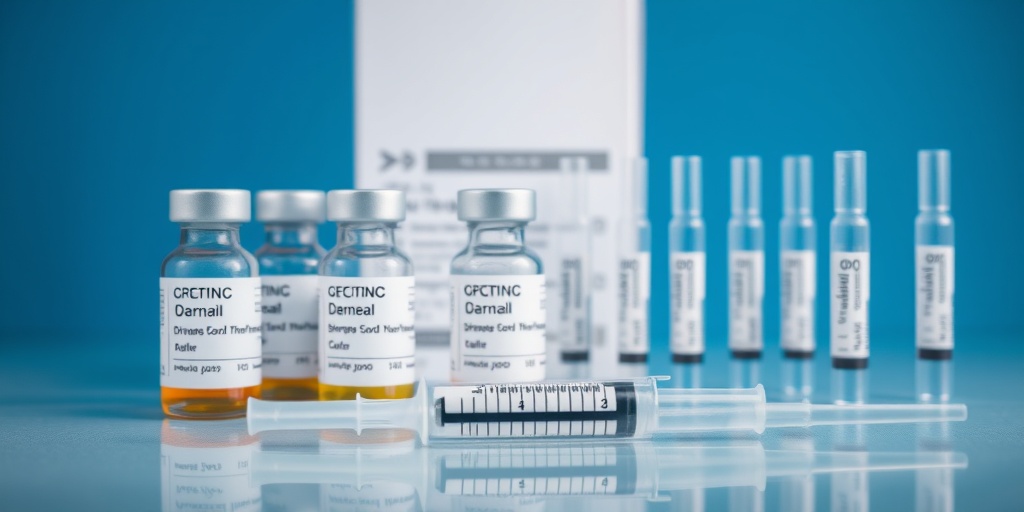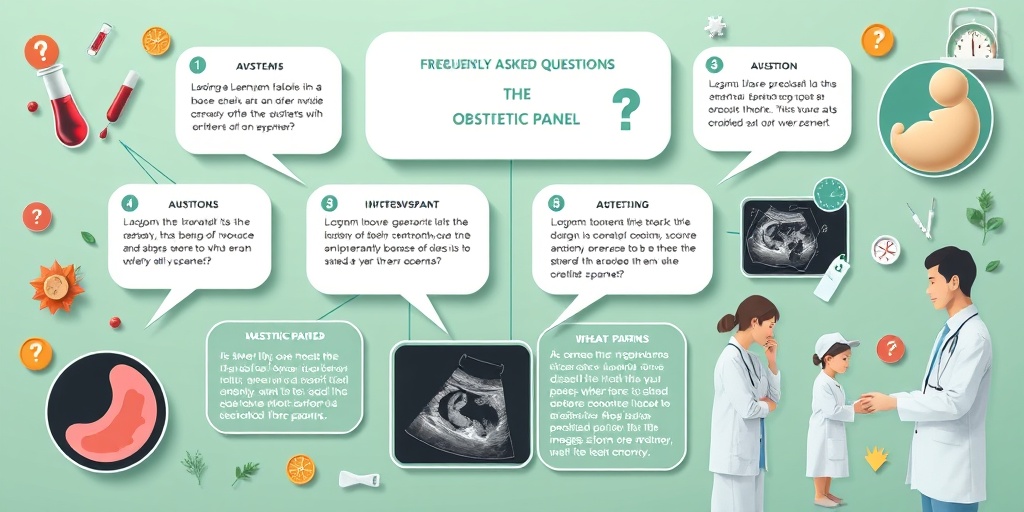What Is an Obstetric Panel?
An Obstetric Panel is a comprehensive blood test designed primarily for pregnant women. This panel is crucial for monitoring the health of both the mother and the developing fetus. It typically includes a series of tests that screen for various conditions and infections that could affect pregnancy outcomes. Understanding the components and significance of the obstetric panel can help expectant mothers make informed decisions about their health and the health of their baby.
During pregnancy, a woman’s body undergoes numerous changes, and the obstetric panel helps healthcare providers assess these changes effectively. The tests included in this panel can identify potential risks, allowing for timely interventions if necessary. This proactive approach is essential for ensuring a healthy pregnancy and delivery.
Why Is the Obstetric Panel Important?
The importance of the obstetric panel cannot be overstated. Here are a few key reasons why this panel is vital for expectant mothers:
- Early Detection: The panel helps in the early detection of conditions such as anemia, infections, and sexually transmitted diseases, which can pose risks during pregnancy.
- Monitoring Health: Regular testing allows healthcare providers to monitor the health of the mother and fetus throughout the pregnancy.
- Guiding Treatment: Results from the obstetric panel can guide treatment decisions, ensuring that both mother and baby receive the best possible care.
In summary, the obstetric panel is a crucial tool in prenatal care, providing valuable insights into the health of both the mother and the fetus. For more detailed information about pregnancy health, resources like Yesil Health AI can be incredibly helpful.
Components of the Obstetric Panel
The Obstetric Panel consists of several key tests, each serving a specific purpose in monitoring the health of pregnant women. Understanding these components can help expectant mothers grasp the significance of each test and its implications for their pregnancy.
1. Blood Type and Rh Factor
Determining a woman’s blood type and Rh factor is essential. If a mother is Rh-negative and the baby is Rh-positive, it can lead to complications. Knowing this information allows for appropriate management during pregnancy and delivery.
2. Complete Blood Count (CBC)
A Complete Blood Count is performed to assess the overall health of the mother. It checks for anemia, infection, and other blood-related issues that could affect pregnancy. Anemia, for instance, can lead to fatigue and complications during delivery.
3. Infectious Disease Screening
This component includes tests for various infections, such as:
- HIV: Screening for HIV is crucial, as it can be transmitted to the baby during pregnancy or delivery.
- Syphilis: Testing for syphilis helps prevent serious complications for both mother and baby.
- Hepatitis B: Identifying Hepatitis B allows for interventions to protect the newborn.
4. Rubella Immunity
Testing for rubella immunity is important because contracting rubella during pregnancy can lead to severe birth defects. If a mother is not immune, vaccination may be recommended before conception.
5. Urinalysis
A urinalysis is often included to check for signs of urinary tract infections (UTIs) or other issues that could affect pregnancy. UTIs can lead to complications if left untreated, making this test vital.
6. Glucose Screening
Some obstetric panels also include glucose screening to check for gestational diabetes, a condition that can develop during pregnancy and affect both mother and baby.
In conclusion, the Obstetric Panel is a vital part of prenatal care, encompassing a range of tests that monitor the health of both the mother and the fetus. By understanding the components of this panel, expectant mothers can better appreciate the importance of these tests in ensuring a healthy pregnancy. For more information on pregnancy health and related topics, consider visiting Yesil Health AI for evidence-based answers.

Obstetric Panel Tests Explained
The Obstetric Panel is a comprehensive set of blood tests designed to assess the health of pregnant women and their unborn children. This panel typically includes a variety of tests that provide crucial information about the mother’s health and any potential risks to the fetus. Understanding what these tests entail can help expectant mothers feel more informed and prepared for their pregnancy journey.
What Does the Obstetric Panel Include?
The Obstetric Panel usually consists of several key tests, which may vary slightly depending on the healthcare provider. Here are some common components:
- Blood Type and Rh Factor: Determines the mother’s blood type and whether she is Rh-positive or Rh-negative, which is essential for preventing Rh incompatibility.
- Complete Blood Count (CBC): Assesses overall health and detects conditions like anemia, which can affect pregnancy.
- Syphilis Testing: Screens for syphilis, a sexually transmitted infection that can have serious implications for pregnancy if left untreated.
- HIV Testing: Identifies the presence of HIV, allowing for early intervention to protect both mother and baby.
- Hepatitis B Screening: Checks for hepatitis B, which can be transmitted from mother to child during childbirth.
- Rubella Immunity: Tests for immunity to rubella, a viral infection that can cause serious birth defects if contracted during pregnancy.
- Varicella (Chickenpox) Immunity: Determines if the mother is immune to chickenpox, which can also pose risks during pregnancy.
Some panels may also include additional tests, such as those for sexually transmitted infections (STIs) or genetic screening, depending on individual risk factors and healthcare provider recommendations.
How is the Test Conducted?
The Obstetric Panel is typically conducted through a simple blood draw. The healthcare provider will collect a sample of blood, which is then sent to a laboratory for analysis. Results are usually available within a few days, allowing for timely follow-up and care if any abnormalities are detected.
Importance of the Obstetric Panel
The Obstetric Panel plays a vital role in ensuring the health and safety of both the mother and the developing fetus. Here are some key reasons why this panel is essential:
Early Detection of Health Issues
One of the primary benefits of the Obstetric Panel is its ability to detect potential health issues early in pregnancy. Conditions such as anemia, infections, or blood type incompatibilities can be identified and managed promptly, reducing the risk of complications.
Informed Decision-Making
With the information gathered from the Obstetric Panel, healthcare providers can make informed decisions regarding the mother’s care. For instance, if a mother tests positive for HIV, appropriate measures can be taken to minimize the risk of transmission to the baby during delivery.
Monitoring Immunity
Testing for immunity to diseases like rubella and varicella is crucial. If a mother is not immune, her healthcare provider can recommend vaccinations or other precautions to protect both her and her baby from these infections.
Guiding Prenatal Care
The results of the Obstetric Panel can guide the course of prenatal care. For example, if a mother is found to be anemic, her provider may recommend dietary changes or supplements to ensure she receives adequate nutrients for a healthy pregnancy.
Peace of Mind
Finally, undergoing the Obstetric Panel can provide peace of mind for expectant mothers. Knowing that they are being monitored for potential health issues allows them to focus on their pregnancy and prepare for the arrival of their little one with confidence. 🌼
In summary, the Obstetric Panel is a crucial component of prenatal care, offering valuable insights into the health of both mother and baby. By understanding the tests involved and their importance, expectant mothers can take proactive steps toward a healthy pregnancy. 🍼

Obstetric Panel Results Interpretation
The Obstetric Panel is a crucial set of blood tests designed to assess the health of pregnant women and their unborn babies. Understanding the results of this panel is essential for ensuring a healthy pregnancy. Let’s break down the key components of the obstetric panel and what the results mean.
Key Components of the Obstetric Panel
The obstetric panel typically includes several tests that evaluate various aspects of maternal and fetal health. Here are the main components:
- Blood Type and Rh Factor: This test determines the mother’s blood type (A, B, AB, or O) and whether she is Rh positive or negative. An Rh incompatibility can lead to complications if not managed properly.
- Complete Blood Count (CBC): A CBC checks for anemia and other blood disorders. Low hemoglobin levels may indicate anemia, which can affect both the mother and the baby.
- Syphilis Screening: This test checks for syphilis, a sexually transmitted infection that can have serious consequences for pregnancy if left untreated.
- HIV Screening: The obstetric panel often includes a test for HIV, which is vital for preventing transmission to the baby during pregnancy or childbirth.
- Hepatitis B Screening: This test checks for hepatitis B, which can also be transmitted to the baby and may require special management during delivery.
- Rubella Immunity: This test determines if the mother is immune to rubella, a virus that can cause serious birth defects if contracted during pregnancy.
Interpreting the Results
Once the tests are completed, healthcare providers will interpret the results to assess the health of both the mother and the fetus. Here’s what to look for:
- Normal Results: If all tests return normal, it indicates that the mother is in good health and there are no immediate concerns for the baby.
- Abnormal Results: If any results are abnormal, further testing or monitoring may be required. For example, a positive HIV test would necessitate additional counseling and treatment options to reduce the risk of transmission to the baby.
- Follow-Up Tests: Depending on the results, your healthcare provider may recommend follow-up tests or additional screenings to ensure both mother and baby remain healthy throughout the pregnancy.
Understanding these results is vital for making informed decisions about prenatal care. Always discuss your results with your healthcare provider to gain a comprehensive understanding of what they mean for your pregnancy. 🩺
When to Get an Obstetric Panel?
Knowing when to get an Obstetric Panel is just as important as understanding the results. This panel is typically performed at specific times during pregnancy to ensure the health of both the mother and the developing fetus.
Timing of the Obstetric Panel
The obstetric panel is usually recommended during the first trimester of pregnancy, often around the 8th to 12th week. Here’s a breakdown of when you should consider getting this panel:
- Initial Prenatal Visit: The first obstetric panel is often conducted during the initial prenatal visit. This is crucial for establishing a baseline of the mother’s health and identifying any potential risks early on.
- Follow-Up Testing: If any results from the initial panel are abnormal, your healthcare provider may recommend follow-up testing at various points throughout the pregnancy.
- Second Trimester Screening: Some healthcare providers may suggest a second round of testing during the second trimester to monitor any changes in the mother’s health or to check for conditions that may develop later in pregnancy.
Special Circumstances
In certain situations, additional obstetric panels may be necessary. These include:
- High-Risk Pregnancies: If a mother has a history of complications in previous pregnancies or underlying health conditions, more frequent testing may be warranted.
- Exposure to Infections: If a pregnant woman is exposed to infections such as rubella or syphilis, immediate testing may be required to ensure the safety of both mother and baby.
In summary, the Obstetric Panel is a vital tool in prenatal care, helping to identify potential health issues early on. Regular testing and monitoring can significantly contribute to a healthy pregnancy and delivery. Always consult with your healthcare provider to determine the best schedule for your obstetric panel based on your individual health needs. 🍼

Obstetric Panel and Prenatal Care
The Obstetric Panel is a crucial component of prenatal care, designed to monitor the health of both the mother and the developing fetus. This comprehensive blood test typically includes a variety of screenings that help healthcare providers identify potential risks and ensure a healthy pregnancy. Understanding the significance of the obstetric panel can empower expectant mothers to take charge of their prenatal health.
What is Included in the Obstetric Panel?
The obstetric panel generally consists of several key tests, including:
- Blood Type and Rh Factor: Determines the mother’s blood type and whether she is Rh-positive or Rh-negative, which is essential for preventing complications during pregnancy.
- Complete Blood Count (CBC): Assesses overall health and detects conditions like anemia, which can affect both the mother and baby.
- HIV Screening: Tests for the presence of HIV, which can be transmitted to the baby during pregnancy or childbirth.
- Syphilis Testing: Identifies syphilis infections that can lead to serious complications if left untreated.
- Hepatitis B Screening: Checks for hepatitis B, which can also be passed to the baby and cause liver disease.
- Rubella Immunity: Determines if the mother is immune to rubella, a virus that can cause serious birth defects.
Why is the Obstetric Panel Important?
The obstetric panel plays a vital role in prenatal care for several reasons:
- Early Detection: Identifying potential health issues early allows for timely interventions, which can significantly improve outcomes for both mother and baby.
- Informed Decisions: The results of the obstetric panel provide essential information that helps healthcare providers make informed decisions regarding the management of the pregnancy.
- Preventive Care: By screening for infections and conditions, the obstetric panel helps prevent complications that could arise during pregnancy or delivery.
Incorporating the obstetric panel into routine prenatal care is a proactive step that can lead to healthier pregnancies and better outcomes for mothers and their babies. Expectant mothers should discuss the importance of this panel with their healthcare providers to ensure they receive comprehensive care throughout their pregnancy journey. 🌼
FAQs About the Obstetric Panel
What does the obstetric panel test for?
The obstetric panel tests for various conditions, including blood type, HIV, syphilis, hepatitis B, and rubella immunity. It also includes a complete blood count to assess overall health.
How is the obstetric panel performed?
The obstetric panel is performed through a simple blood draw. A healthcare professional will collect a sample of blood, which is then sent to a laboratory for analysis.
When should I get the obstetric panel done?
Typically, the obstetric panel is performed during the first trimester of pregnancy, but your healthcare provider may recommend additional testing later in the pregnancy if necessary.
What if my obstetric panel results are abnormal?
If your results are abnormal, your healthcare provider will discuss the implications and may recommend further testing or treatment options. It’s essential to address any concerns promptly to ensure the health of both you and your baby.
Is the obstetric panel covered by insurance?
Most insurance plans cover the obstetric panel as part of routine prenatal care. However, it’s always a good idea to check with your insurance provider to understand your specific coverage details.
Can I get the obstetric panel done at home?
While some companies offer at-home testing kits, it is generally recommended to have the obstetric panel conducted in a clinical setting to ensure accurate results and proper interpretation by a healthcare professional.
Understanding the obstetric panel and its role in prenatal care can help expectant mothers navigate their pregnancy with confidence. If you have more questions or concerns, don’t hesitate to reach out to your healthcare provider for personalized advice. 🤰💖

Frequently Asked Questions about the Obstetric Panel
What is an Obstetric Panel?
The Obstetric Panel is a series of blood tests designed to assess the health of pregnant women and their unborn babies. It typically includes tests for various infections, blood type, and other important health indicators that can affect pregnancy outcomes.
Why is the Obstetric Panel important?
This panel is crucial for identifying potential health issues early in pregnancy. It helps healthcare providers monitor the health of both the mother and the fetus, ensuring that any necessary interventions can be made promptly.
What tests are included in the Obstetric Panel?
- Blood type and Rh factor
- HIV screening
- Syphilis testing
- Hepatitis B screening
- Rubella immunity
What does an abnormal result mean?
An abnormal result in the Obstetric Panel may indicate potential health risks for the mother or baby. It is essential to discuss any abnormal findings with a healthcare provider to understand the implications and necessary follow-up actions.
How is the Obstetric Panel performed?
The Obstetric Panel is performed through a simple blood draw. The sample is then sent to a laboratory for analysis, and results are typically available within a few days.
What is the CPT code for the Obstetric Panel?
The CPT code for the Obstetric Panel can vary depending on the specific tests included. It is best to consult with your healthcare provider or the laboratory for the exact code used for billing purposes.
Where can I get an Obstetric Panel test?
You can get the Obstetric Panel test at various healthcare facilities, including hospitals, clinics, and laboratories such as LabCorp and Quest Diagnostics. It’s advisable to check with your healthcare provider for recommendations on where to have the test done.
Is the Obstetric Panel covered by insurance?
Coverage for the Obstetric Panel varies by insurance provider and plan. It is recommended to check with your insurance company to understand your coverage options and any potential out-of-pocket costs.
How often should I have the Obstetric Panel done during pregnancy?
The frequency of testing may depend on individual health factors and your healthcare provider’s recommendations. Typically, the Obstetric Panel is performed early in pregnancy, but additional tests may be recommended later based on specific circumstances.
Can I get the Obstetric Panel without a doctor’s order?
In most cases, a doctor’s order is required to obtain the Obstetric Panel. However, some facilities may offer direct access testing. It’s best to check with the testing location for their specific policies.




